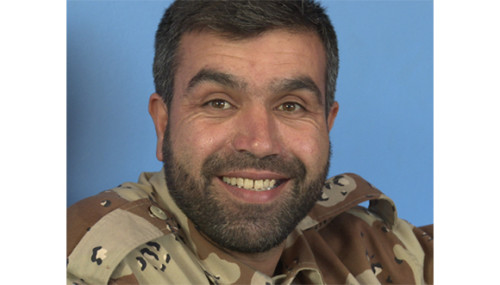PHOTO: Leader of the Syrian Revolutionary Front, Jamal Maarouf
Within 48 hours, headlines of an insurgent offensive in northwest Syria, surrounding and briefly moving into the city of Idlib, have been replaced by news of fighting between insurgent factions in the province.
The initial claim, spread by the British-based “monitoring group” Syrian Observatory of Human Rights, was that the Islamist faction Jabhat al-Nusra “attacked” the Syrian Revolutionary Front — apparently in a bid to secure the leading position in the insurgency.
Some activists offer a different story. They say that the SRF started the skirmishes, reportedly in and near the town of Maarat al-Num’an, and that local elements of Jabhat al-Nusra fought back. Residents called for both sides to cease fire, while other brigades reportedly halted traffic to stop both SRF and Jabhat al-Nusra reinforcements.
A Jabhat al-Nusra fighter wrote on social media:
Nusra and other mujahideen were busy with the battle in Idlib City when SRF backstabbed them in Idlib….
The fighting begun because a group within SRF defected and joined [the insurgent faction] Ahrar Al-Sham.
SRF attacked that group in their base where some Nusra soldiers were present as well. SRF imprisoned several Ansar and Muhajireen [fighters].
The fighter said the conflict was compounded when the Harakat Hazm brigade — which has received high-profile PR support and heavy weapons from the US — blocked Jabhat al-Nusra’s reinforcement. Skirmishes followed with soldiers captured from both sides.
A leader of Jabhat al-Nusra, Abu Maria al-Qahtani, called on both sides to halt the fighting and to unite against the common enemy of the “Islamic State”, which he said has been assisted by the US aerial intervention — “seeking to bury the Syrian Revolution, intentionally or unintentionally” — in northern Syria.
However, a Facebook account linked to the Free Syrian Army put all the blame on Jabhat al-Nusra for “the attack waged against the FSA” and maintained that Al-Nusra Front rejected all the initiatives, offered by the military factions’ leaders and by scholars, to stop fighting between the two sides”.
Individual FSA units refrained from the one-sided blame. Instead, the FSA groups in Jarjanaz issued an undertaking “not to be dragged towards the in-fighting” while appealing for a halt.
The in-fighting has been accompanied by tension over Monday’s insurgent offensive.
Earlier this week, Jabhat al-Nusra led the insurgent attacks near and in Idlib, which took the surrounding checkpoints around the city and briefly occupied positions such as the Governor’s building inside the city. However, its officials accuse the SRF of “sitting on its hands” while other factions fought the Assad regime’s forces.
Critics of Jabhat al-Nusra have hit back by spreading the rumor — which has no basis — that the Islamic State assisted the Islamist faction in its operations.
The Syrian Revolutionary Front was formed in December 2013 by some Free Syrian Army brigades in northwest Syria. Its leader, Jamal Maarouf, was soon feted by the US press as an insurgent leader whom Washington could support. David Ignatius, the Washington Post columnist with close links to the Obama Administration, wrote:
The United States needs an alternate strategy for strengthening Syrian moderates who can resist both the brutal Bashar al-Assad regime and al-Qaeda extremists.
[An] opposition leader who may help get the balance right is Jamal Maarouf.
See Syria: The New Poster-Boy Commander & Insurgents’ “Moderate” Strategy to Get US Support
Within the insurgency, however, the SRF quickly gained a controversial reputation. Its members were accused of corruption and widespread theft, including raids on US supplies in insurgent-controlled warehouses in December 2013. Maarouf was forced to respond that he and his force were not war profiteers.
See Syria: Washington’s Favorite Insurgent Maarouf “I Am Not a Thief”
Still, the SRF has always held the propaganda advantage — at least among nominal Western supporters of the insurgency — over Jabhat al-Nusra, which has been listed as a “terrorist organization” by the US since late 2012 because of its historic links to Al Qa’eda.
The animosity between the US and Jabhat al-Nusra was reinforced last month by the American aerial intervention, nominally against the Islamic State, in northern Syria. The first US missile strikes hit compounds of Jabhat al-Nusra, killing more than 60 of its members as well as at least 14 civilians, in Idlib and Aleppo Provinces.

